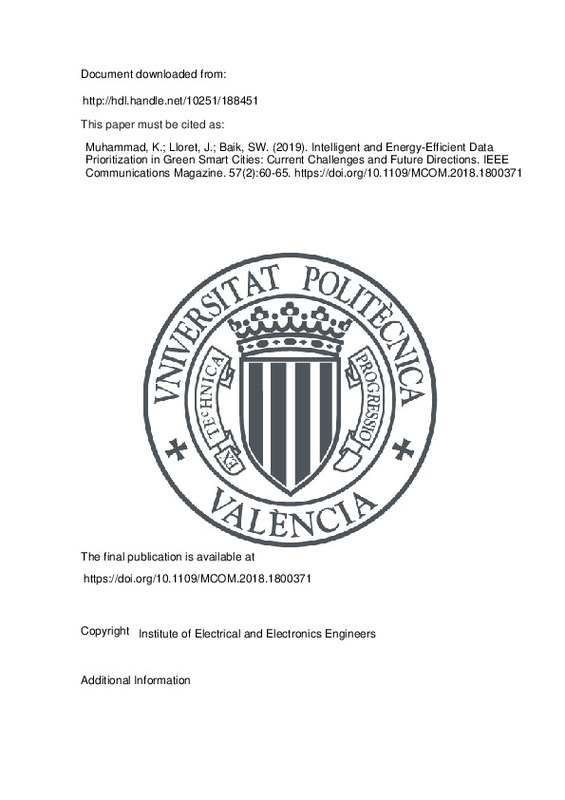JavaScript is disabled for your browser. Some features of this site may not work without it.
Buscar en RiuNet
Listar
Mi cuenta
Estadísticas
Ayuda RiuNet
Admin. UPV
Intelligent and Energy-Efficient Data Prioritization in Green Smart Cities: Current Challenges and Future Directions
Mostrar el registro sencillo del ítem
Ficheros en el ítem
| dc.contributor.author | Muhammad, Khan
|
es_ES |
| dc.contributor.author | Lloret, Jaime
|
es_ES |
| dc.contributor.author | Baik, Sung Wook
|
es_ES |
| dc.date.accessioned | 2022-10-20T18:03:41Z | |
| dc.date.available | 2022-10-20T18:03:41Z | |
| dc.date.issued | 2019-02-21 | es_ES |
| dc.identifier.issn | 0163-6804 | es_ES |
| dc.identifier.uri | http://hdl.handle.net/10251/188451 | |
| dc.description.abstract | [EN] The excessive use of digital devices such as cameras and smartphones in smart cities has produced huge data repositories that require automatic tools for efficient browsing, searching, and management. Data prioritization (DP) is a technique that produces a condensed form of the original data by analyzing its contents. Current DP studies are either concerned with data collected through stable capturing devices or focused on prioritization of data of a certain type such as surveillance, sports, or industry. This necessitates the need for DP tools that intelligently and cost-effectively prioritize a large variety of data for detecting abnormal events and hence effectively manage them, thereby making the current smart cities greener. In this article, we first carry out an in-depth investigation of the recent approaches and trends of DP for data of different natures, genres, and domains of two decades in green smart cities. Next, we propose an energy-efficient DP framework by intelligent integration of the Internet of Things, artificial intelligence, and big data analytics. Experimental evaluation on real-world surveillance data verifies the energy efficiency and applicability of this framework in green smart cities. Finally, this article highlights the key challenges of DP, its future requirements, and propositions for integration into green smart cities | es_ES |
| dc.description.sponsorship | This work was supported by a National Research Foundation of Korea (NRF) grant funded by the Korea government (MSIP) (no. 2016R-1A2B4011712). | es_ES |
| dc.language | Inglés | es_ES |
| dc.publisher | Institute of Electrical and Electronics Engineers | es_ES |
| dc.relation.ispartof | IEEE Communications Magazine | es_ES |
| dc.rights | Reserva de todos los derechos | es_ES |
| dc.subject.classification | INGENIERIA TELEMATICA | es_ES |
| dc.title | Intelligent and Energy-Efficient Data Prioritization in Green Smart Cities: Current Challenges and Future Directions | es_ES |
| dc.type | Artículo | es_ES |
| dc.identifier.doi | 10.1109/MCOM.2018.1800371 | es_ES |
| dc.relation.projectID | info:eu-repo/grantAgreement/NRF//2016R-1A2B4011712/ | es_ES |
| dc.rights.accessRights | Abierto | es_ES |
| dc.contributor.affiliation | Universitat Politècnica de València. Departamento de Comunicaciones - Departament de Comunicacions | es_ES |
| dc.description.bibliographicCitation | Muhammad, K.; Lloret, J.; Baik, SW. (2019). Intelligent and Energy-Efficient Data Prioritization in Green Smart Cities: Current Challenges and Future Directions. IEEE Communications Magazine. 57(2):60-65. https://doi.org/10.1109/MCOM.2018.1800371 | es_ES |
| dc.description.accrualMethod | S | es_ES |
| dc.relation.publisherversion | https://doi.org/10.1109/MCOM.2018.1800371 | es_ES |
| dc.description.upvformatpinicio | 60 | es_ES |
| dc.description.upvformatpfin | 65 | es_ES |
| dc.type.version | info:eu-repo/semantics/publishedVersion | es_ES |
| dc.description.volume | 57 | es_ES |
| dc.description.issue | 2 | es_ES |
| dc.relation.pasarela | S\473025 | es_ES |
| dc.contributor.funder | National Research Foundation of Korea | es_ES |







![[Cerrado]](/themes/UPV/images/candado.png)

